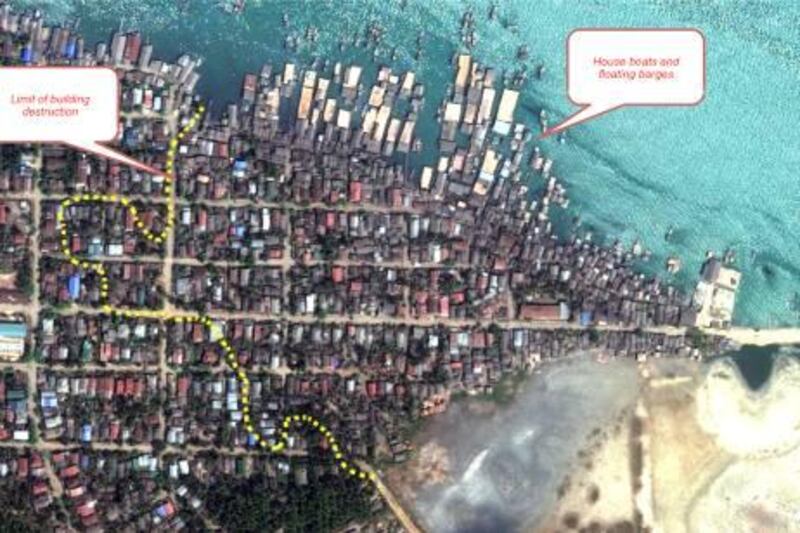SITTWE, MYANMAR // Fears are growing for thousands of Rohingya Muslims after a week of violence in western Myanmar.
Satellite images show "near total destruction" of a once-thriving Rohingya coastal community in Kyaukpyu, scene of battles between Rohingya and ethnic Rakhine Buddhists.
More than 811 buildings and houseboats were razed, forcing many Rohingya to flee north by sea toward the state capital, Sittwe, said Human Rights Watch, who released the images.
Myanmar "urgently needs to provide security for the Rohingya … who are under vicious attack", said Phil Robertson, the group's deputy Asia director.
There were widespread unconfirmed reports of boatloads of Rohingya trying to cross to Bangladesh, which has denied them refugee status since 1992.
Dozens of boats full of Rohingya with no food or water were seeking access on Friday to overcrowded refugee camps around Sittwe. Some boats were blocked by security forces from reaching the shore and few Rohingya managed to reach the camps.
Wan-lark foundation, an organisation that has been assisting Rakhine Buddhist refugees, said no clashes in the state had been reported to them since Friday night, but dead bodies of Rakhines had been found.
"Around 6pm last night in Kyawtyaw, the bodies of 16 Rakhines were found in the sea. They had died during the attacks on Thursday. We're looking for more bodies," representative Tun Mein Thein said yesterday.
The chaos suggests Myanmar's reformist government is struggling to contain historic ethnic and religious tensions suppressed during nearly a half century of military rule that ended last year.
A Rakhine government spokesman put the death toll at 112 as of Friday. But within hours state media revised it to 67 killed from October 21 to 25, with 95 wounded and nearly 3,000 houses destroyed.
The death toll could be far higher, said Human Rights Watch, based on "allegations from witnesses fleeing scenes of carnage and the government's well-documented history of underestimating figures that might lead to criticism of the state".
The clashes come just five months after communal unrest killed more than 80 people and displaced at least 75,000 in the same region.
A boat carrying 120 Muslims from Kyaukpyu was intercepted by Rakhines, who killed the men and raped the women, the advocacy group Burmese Rohingya Organisation UK said.
"Ethnic cleansing is happening under the noses of the international community and they are doing nothing," said Tun Khin, the group's president. "We have confirmed reports that hundreds of people have been killed and the government must be aware of that."
Kyaukpyu is crucial to China's most strategic investment in Myanmar: twin pipelines that will carry oil and natural gas through the town on the Bay of Bengal to China's energy-hungry western provinces.
The United Nations has warned that Myanmar's fledgling democracy could be "irreparably damaged" by the violence.
Rohingya are officially stateless. Buddhist-majority Myanmar's government regards the estimated 800,000 Rohingya as illegal immigrants from Bangladesh, and not as one of the country's 135 official ethnic groups, and denies them citizenship.
But many of those expelled from Kyaukpyu are not Rohingya but Muslims from the officially recognised Kaman minority, said Chris Lewa, director of the Rohingya advocacy group Arakan Project. "It's not just anti-Rohingya violence any more, it's anti-Muslim," she said.
It was unclear what set off the latest arson and killing. In June, tension flared after the rape and murder of a Buddhist woman that was blamed on Muslims, but there was no obvious spark this time.
Rights groups such as Amnesty International have called on Myanmar to amend or repeal a 1982 citizenship law to end the Rohingya's stateless condition.





